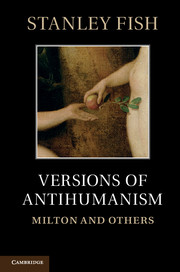Introduction: intention, historicism and interpretation
Published online by Cambridge University Press: 05 May 2012
Summary
A NOTE ON METHOD
Although it is not fully argued in the essays collected here, underlying the readings I offer of Milton and others is a position on the relationship between intention and interpretation. Indeed, my argument is that it is not a relationship, but an identity. Interpretation just is the act of determining what someone meant by these words (or this picture or that film or that gesture). So the answer to the very old question, “What is the meaning of a text?” is: “A text means what its author or authors intend,” period.
Simply to propose this thesis is, I know, to provoke a host of objections. Why focus on intention which is subjective and elusive when you have the text which is material and immediately available? How does one determine intention anyway? How do you get inside people's heads? What evidence, apart from the text, is relevant? What about the intentions of authors long dead? What about authors who have conflicting intentions? What about committees and legislative bodies? Can they be said to have intentions?
There are answers to these questions, but before I offer a few of them I want to point out that while the intentional thesis is radically historical, it is not historicist as that word is usually understood. Let me explain. The intentional thesis is historical because it identifies meaning with a purposive act performed by an author at a particular moment. The question is not: “What would Milton have meant by Samson Agonistes had he written it in the wake of 9/11?” but: “What did Milton mean by Samson Agonistes in 1670 or 1648 or 1659 or 1661?” (all dates proposed by various critics). To answer the second, and genuinely interpretive, question you have to do the historical work of figuring out what Milton had in mind when he wrote (or dictated) the play’s words, and that involves reading those words in the light of an intention Milton could have had at the time of composition.
- Type
- Chapter
- Information
- Versions of AntihumanismMilton and Others, pp. 1 - 20Publisher: Cambridge University PressPrint publication year: 2012

